Fleurs du Mal Magazine


Or see the index
Tatiana du Plessix, the wife of a French diplomat, was a beautiful, sophisticated “white Russian” who had been the muse of the famous Russian poet Vladimir Mayakovsky.
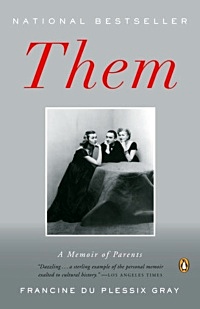 Alexander Liberman, the ambitious son of a prominent Russian Jew, was a gifted magazine editor and aspiring artist. As part of the progressive artistic Russian émigré community living in Paris in the 1930s, the two were destined to meet. They began a passionate affair, and the year after Paris was occupied in World War II they fled to New York with Tatiana’s young daughter, Francine.
Alexander Liberman, the ambitious son of a prominent Russian Jew, was a gifted magazine editor and aspiring artist. As part of the progressive artistic Russian émigré community living in Paris in the 1930s, the two were destined to meet. They began a passionate affair, and the year after Paris was occupied in World War II they fled to New York with Tatiana’s young daughter, Francine.
There they determinedly rose to the top of high society, holding court to a Who’s Who list of the midcentury’s intellectuals and entertainers. Flamboyant and outrageous, bold and brilliant, they were irresistible to friends like Marlene Dietrich, Salvador Dalí, and the publishing tycoon Condé Nast. But to those who knew them well they were also highly neurotic, narcissistic, and glacially self-promoting, prone to cut out of their lives, with surgical precision, close friends who were no longer of use to them.
Tatiana became an icon of New York fashion, and the hats she designed for Saks Fifth Avenue were de rigueur for stylish women everywhere. Alexander Liberman, who devotedly raised Francine as his own child from the time she was nine, eventually came to preside over the entire Condé Nast empire. The glamorous life they shared was both creative and destructive and was marked by an exceptional bond forged out of their highly charged love and raging self-centeredness. Their obsessive adulation of success and elegance was elevated to a kind of worship, and the high drama that characterized their lives followed them to their deaths. Tatiana, increasingly consumed with nostalgia for a long-lost Russia, spent her last years addicted to painkillers. Shortly after her death, Alexander, then age eighty, shocked all who knew him by marrying her nurse.
Them: A Portrait of Parents is a beautifully written homage to the extraordinary lives of two fascinating, irrepressible people who were larger than life emblems of a bygone age. Written with honesty and grace by the person who knew them best, this generational saga is a survivor’s story. Tatiana and Alexander survived the Russian Revolution, the fall of France, and New York’s factory of fame. Their daughter, Francine, survived them.
Francine du Plessix Gray is a regular contributor to The New Yorker and the author of numerous essays and books, including Simone Weil, At Home with the Marquis de Sade: A Life, Rage and Fire, Lovers and Tyrants, and Soviet Women. She lives with her husband, the painter Cleve Gray.
Francine Du Plessix Gray
Them
A Memoir of Parents
Paperback
$18.00
Penguin Books
2006
544 Pages
ISBN 9780143037194
books
fleursdumal.nl magazine
More in: - Book News, - Book Stories, Archive O-P, Majakovsky, Vladimir
Mijnheer Cros gaat op een bijzondere manier in op het leven van Charles Cros (1842-1888).
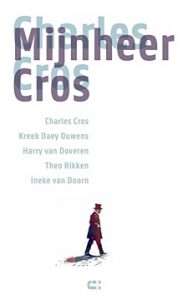 Deze literaire ingenieur (Liesbeth van Nes) en boeiende buitenstaander (Bernlef) kan worden genoemd als de literaire voorloper op Dada, het surrealisme en het absurdisme, maar ook als de commercieel weinig gewiekste uitvinder van de fonograaf, de kleurenfotografie en (met een knipoog) de communicatie met andere planeten.
Deze literaire ingenieur (Liesbeth van Nes) en boeiende buitenstaander (Bernlef) kan worden genoemd als de literaire voorloper op Dada, het surrealisme en het absurdisme, maar ook als de commercieel weinig gewiekste uitvinder van de fonograaf, de kleurenfotografie en (met een knipoog) de communicatie met andere planeten.
Een bescheiden selectie van zijn poëzie en monologen vormt in samenhang met zijn hinkende privéleven, de springplank voor losjes op zijn leven geïnspireerde schetsen, in proza, poëzie en beeld van Harry van Doveren, Kreek Daey Ouwens, Theo Rikken en Ineke van Doorn.
Charles Cros (1842-1888) was een Frans dichter. Hij mag worden gezien als een van de literaire voorlopers van het dadaïsme, het surrealisme en het absurdisme. Daarnaast was hij uitvinder van de fonograaf en de kleurenfotografie. Het lukte hem echter niet deze uitvindingen te gelde te maken.
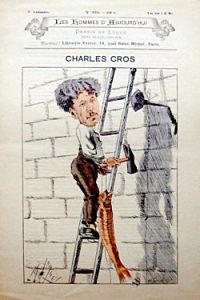
Mijnheer Cros
Cros, Charles
Rikken, Theo – Doveren, Harry van – Doorn, Ineke van – Daey Ouwens, Kreek
ISBN 978-90-8684-162-2
Formaat: 12.5 x 20 cm.
Omvang: 128 pag.
€17,50
2018
Uitgeverij IJzer
new books
fleursdumal.nl magazine
More in: - Book News, Archive C-D, Art & Literature News, Cros, Charles, DADA, Ouwens, Kreek Daey, Photography, SURREALISM
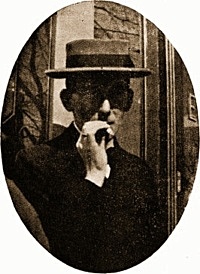
Die Ersten
Die Ersten sinds, sie sind im besten Zug
Vom willenlosen Haufen sich zu lösen.
Erkennend eitel Schimmer, seichten Trug
Der großen Reden abgenützte Blößen,
Klangvolle Phrasen, ein vereinter Schwall
Der überflutet Erdehöhen und Täler,
Allüberall der gleiche Wiederhall,
Der gleiche Köder und der gleiche Wähler.
Wohl wächst der Massen Schrei nach Glück und Brot
Doch übertönt er nicht die Worte der Vertreter,
Es fallen Opfer tiefster Seelennot,
Die Masse fällt dein Zeichen der Verräter.
So lausch ich freudig, wenn mit wildem Schrei
Die Brust erfüllt von froher Zukunft ahnen
Sich einer ringt vom Heerdentaumel frei
Kraftvoll empor auf selbstgewollten Bahnen.
Hugo Ball
(1886 – 1927)
Erstdruck in:
Der Revoluzzer (Zürich),
2. Jg., Nr. 4/5, Mai 1916.
fleursdumal.nl magazine
More in: Archive A-B, Ball, Hugo, DADA, Dada, Dadaïsme
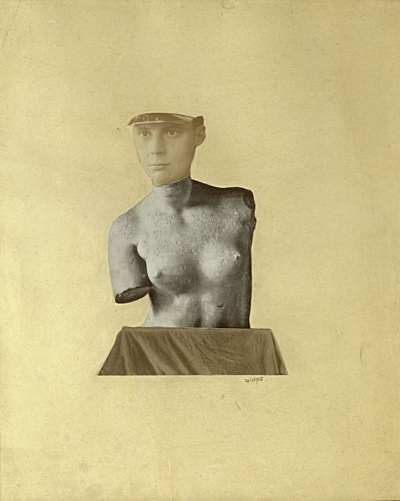
Johannes Theodor Baargeld (1892-1927)
Typische Vertikalklitterung als Darstellung des Dada Baargeld (Typical Vertical Mess as Depiction of the Dada Baargeld – Typique amalgame vertical en tant que représentation du Dada Baargeld)), 1920, collage
fleursdumal.nl magazine
More in: Baargeld, Johannes Theodor, DADA, Dada, Dadaïsme, Galerie Deutschland
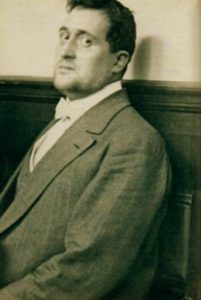
La Chanson Du Malaime
Un soir de demi-brume à Londres
Un voyou qui ressemblait à
Mon amour vint à ma rencontre
Et le regard qu’il me jeta
Me fit baisser les yeux de honte
Je suivis ce mauvais garçon
Qui sifflotait mains dans les poches
Nous semblions entre les maisons
Onde ouverte de la mer Rouge
Lui les Hébreux moi Pharaon
Qui tombent ces vagues de briques
Si tu ne fus pas bien aimée
Je suis le souverain d’Egypte
Sa sœur-épouse son armée
Si tu n’es pas l’amour unique.
Guillaume Apollinaire
(1880 – 1918)
La Chanson Du Malaime
fleursdumal.nl magazine
More in: Apollinaire, Guillaume, Archive A-B, Guillaume Apollinaire
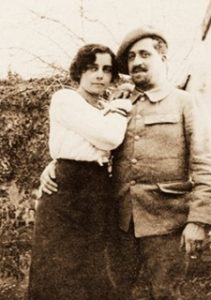
La Dame
Toc toc Il a fermé sa porte
Les lys du jardin sont flétris
Quel est donc ce mort qu’on emporte
Tu viens de toquer à sa porte
Et trotte trotte
Trotte la petite souris
Guillaume Apollinaire
(1880 – 1918)
La Dame
Alcools – poèmes 1898-1913
Paris : Éditions de la Nouvelle Revue française,
troisième édition, 1920
fleursdumal.nl magazine
More in: Apollinaire, Guillaume, Archive A-B, Guillaume Apollinaire
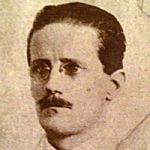
Lean Out of the Window
Lean out of the window,
Goldenhair,
I hear you singing
A merry air.
My book was closed,
I read no more,
Watching the fire dance
On the floor.
I have left my book,
I have left my room,
For I heard you singing
Through the gloom.
Singing and singing
A merry air,
Lean out of the window,
Goldenhair.
James Joyce
(1882-1941)
Lean Out of the Window
fleursdumal.nl magazine
More in: Archive I-J, Archive I-J, Joyce, James, Joyce, James
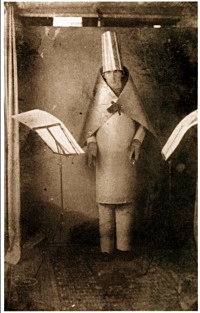
Bagatelle
Vor meinem Fenster,
Im Sonnenschein
Sitzen Engelein.
Eins, zwei, drei Engelein
Und äugeln herein.
Sie hauchen an die Scheiben
Und kichern sich an,
Und schreiben
Deinen Namen hin.
Und kichern sich an
Und verwischen ihn.
Und blinzeln gar boshaft
Und neckisch herein,
Und flattern fort
Die drei Engelein.
Hugo Ball
(1886-1927)
Bagatelle
fleursdumal.nl magazine
More in: Archive A-B, Ball, Hugo, DADA, Dada, Dadaïsme
Drawing on draft manuscripts and other archival material, James Joyce and Absolute Music, explores Joyce’s deep engagement with musical structure, and his participation in the growing modernist discourse surrounding 19th-century musical forms.
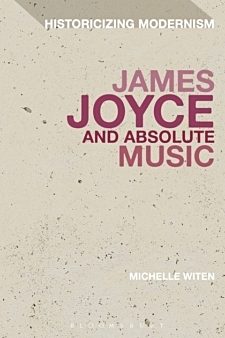 Michelle Witen examines Joyce’s claim of having structured the “Sirens” episode of his masterpiece, Ulysses, as a fuga per canonem, and his changing musical project from his early works, such as Dubliners and A Portrait of the Artist as a Young Man.
Michelle Witen examines Joyce’s claim of having structured the “Sirens” episode of his masterpiece, Ulysses, as a fuga per canonem, and his changing musical project from his early works, such as Dubliners and A Portrait of the Artist as a Young Man.
Informed by a deep understanding of music theory and history, the book goes on to consider the “pure music” of Joyce’s final work, Finnegans Wake.
Demonstrating the importance of music to Joyce, this ground-breaking study reveals new depths to this enduring body of work.
Towards a Modernist Condition of Absolute Music – Joyce’s Early Use of Music – Joyce’s fuga per canonem: A Case of Structure – Joyce’s fuga per canonem: A Case of Effect – Voided Fugue in “Circe” – “It’s Pure Music”: Finnegans Wake
Michelle Witen is Postdoctoral Teaching and Research Fellow at the University of Basel, Switzerland.
Michelle Witen
James Joyce and Absolute Music
Published: 22-02-2018
Format: Hardback
Edition: 1st
Extent: 320 p.
ISBN: 9781350014220
Imprint: Bloomsbury Academic
Series: Historicizing Modernism
Illustrations: 9 bw illus
Dimensions: 234 x 156 mm
RRP: £85.00
literature and music
fleursdumal.nl magazine
More in: # Music Archive, Archive I-J, Archive I-J, Art & Literature News, Joyce, James, Joyce, James
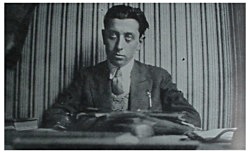
Le Livre secret pour Youki
Ma chérie ma chérie ma Youki
Je n’aime et n’aimerai que toi
Et tu m’aimeras je t’appelle Youki
Reviens ma chérie
Les heures coulent à t’attendre
Je ne pense qu’à toi
Souviens-toi de tes paroles d’espoir Youki
Ne me prépare pas une déception plus
Grande ma chérie
Toi et pas d’autre que toi
Et pas d’autre que moi
N’est-ce pas mon amour
Robert Desnos (1900 – 1945)
– Ma chérie ma chérie ma Youki –
dans Destinée arbitraire
fleursdumal.nl magazine
More in: Archive C-D, Desnos, Robert, Surrealism

Écrits
La vie répond – ce n’est pas vain
on peut agir
contre – pour
La vie exige
le mouvement
La vie c’est le cours du sang
le sang ne s’arrête pas de courir dans les veines
je ne peux pas m’arrêter de vivre
d’aimer les êtres humains
comme j’aime les plantes
de voir dans les regards une réponse ou un appel
de sonder les regards comme un scaphandre
mais rester là
entre la vie et la mort
à disséquer des idées
épiloguer sur le désespoir
Non
ou tout de suite : le revolver
il y a des regards comme le fond de la mer
et je reste là
quelquefois je marche et les regards se croisent
tout en algues et détritus
d’autres fois chaque être est une réponse ou un appel
Laure
(Colette Peignot 1903 – 1938)
Écrits
fleursdumal.nl magazine
More in: Archive K-L, Archive O-P, Laure (Colette Peignot)
 Dada ist eine neue Kunstrichtung. Das kann man daran erkennen, daß bisher niemand etwas davon wußte und morgen ganz Zürich davon reden wird. Dada stammt aus dem Lexicon. Es ist furchtbar einfach. Im Französischen bedeutets Steckenpferd. Im Deutschen: Addio, steigt mir bitte den Rücken runter, auf Wiedersehen ein ander Mal! Im Rumänischen: ‘Ja wahrhaftig, Sie haben Recht, so ist es. Jawohl, wirklich. Machen wir’. Und so weiter.
Dada ist eine neue Kunstrichtung. Das kann man daran erkennen, daß bisher niemand etwas davon wußte und morgen ganz Zürich davon reden wird. Dada stammt aus dem Lexicon. Es ist furchtbar einfach. Im Französischen bedeutets Steckenpferd. Im Deutschen: Addio, steigt mir bitte den Rücken runter, auf Wiedersehen ein ander Mal! Im Rumänischen: ‘Ja wahrhaftig, Sie haben Recht, so ist es. Jawohl, wirklich. Machen wir’. Und so weiter.
Ein internationales Wort. Nur ein Wort und das Wort als Bewegung. Es ist einfach furchtbar. Wenn man eine Kunstrichtung daraus macht, muß das bedeuten, man will Komplikationen wegnehmen. Dada Psychologie, Dada Literatur, Dada Bourgeoisie und ihr, verehrteste Dichter, die ihr immer mit Worten, nie aber das Wort selber gedichtet habt. Dada Weltkrieg und kein Ende, Dada Revolution und kein Anfang. Dada ihr Freunde und Auchdichter, allerwerteste Evangelisten. Dada Tzara, Dada Huelsenbeck, Dada m’dada, Dada mhm’ dada, Dada Hue, Dada Tza.
Wie erlangt man die ewige Seligkeit? Indem man Dada sagt. Wie wird man berühmt? Indem man Dada sagt. Mit edlem Gestus und mit feinem Anstand. Bis zum Irrsinn, bis zur Bewußtlosigkeit. Wie kann man alles Aalige und Journalige, alles Nette und Adrette, alles Vermoralisierte, Vertierte, Gezierte abtun? Indem man Dada sagt. Dada ist die Weltseele, Dada ist der Clou, Dada ist die beste Lilienmilchseife der Welt. Dada Herr Rubiner, Dada Herr Korrodi, Dada Herr Anastasius Lilienstein.
Das heißt auf Deutsch: die Gastfreundschaft der Schweiz ist über alles zu schätzen, und im Ästhetischen kommt’s auf die Norm an. Ich lese Verse, die nichts weniger vorhaben als: auf die Sprache zu verzichten. Dada Johann Fuchsgang Goethe. Dada Stendhal. Dada Buddha, Dalai Lama, Dada m’dada, Dada m’dada, Dada mhm’ dada. Auf die Verbindung kommt es an, und daß sie vorher ein bißchen unterbrochen wird. Ich will keine Worte, die andere erfunden haben. Alle Worte haben andere erfunden. Ich will meinen eigenen Unfug, und Vokale und Konsonanten dazu, die ihm entsprechen. Wenn eine Schwingung sieben Ellen lang ist, will ich füglich Worte dazu, die sieben Ellen lang sind. Die Worte des Herrn Schulze haben nur zwei ein halb Zentimeter.
Da kann man nun so recht sehen, wie die artikulierte Sprache entsteht. Ich lasse die Laute ganz einfach fallen. Worte tauchen auf, Schultern von Worten; Beine, Arme, Hände von Worten. Au, oi, u. Man soll nicht zuviel Worte aufkommen lassen. Ein vers ist die Gelegenheit, möglichst ohne Worte und ohne die Sprache auszukommen. Diese vermaledeite Sprache, an der Schmutz klebt wie von Maklerhänden, die die Münzen abgegriffen haben. Das Wort will ich haben, wo es aufhört und wo es anfängt.
Jede Sache hat ihr Wort; da ist das Wort selber zur Sache geworden. Warum kann der Baum nicht Pluplusch heißen, und Pluplubasch, wenn es geregnet hat? Und warum muß er überhaupt etwas heißen? Müssen wir denn überall unseren Mund dran hängen? Das Wort, das Wort, das Weh gerade an diesem Ort, das Wort, meine Herren, ist eine öffentliche Angelegenheit ersten Ranges.
Hugo Ball
(1886-1927)
Eröffnungs-Manifest, 1. Dada-Abend
(Opening-Manifest of the 1st Dada-Evening)
Zürich, 14. Juli 1916
fleursdumal.nl magazine
More in: Archive A-B, Archive A-B, Ball, Hugo, Dada, DADA, Dadaïsme
Thank you for reading Fleurs du Mal - magazine for art & literature